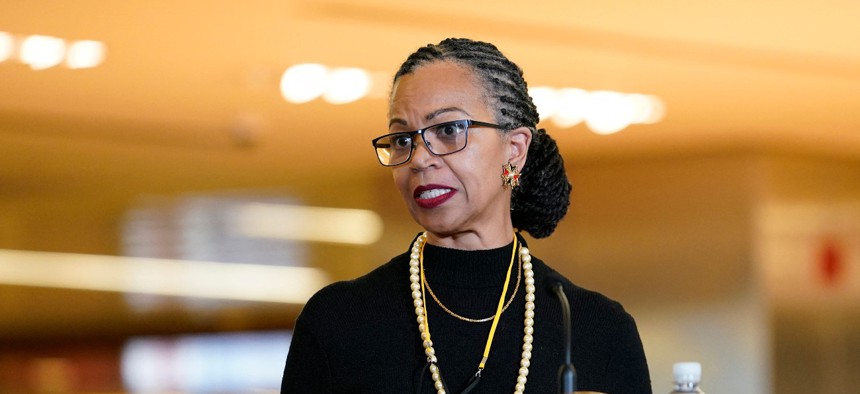
Amb. Gina Abercrombie-Winstanley, a 30-year diplomat and the chief diversity and inclusion officer at the State Department, speaks during a ceremony in February. The ambassador testified at a Senate hearing on Tuesday about the department’s DEIA efforts. SUSAN WALSH/Getty Images
The State Department’s Diversity and Inclusion Officer Says ‘This Time is Different’
Amb. Gina Abercrombie-Winstanley joined the U.S. Agency for International Development’s chief diversity officer, and the two testified about their work before a Senate committee on Tuesday.
The official in charge of diversity, equity, inclusion and accessibility efforts at the State Department told lawmakers on Tuesday that “this time is different,” while recapping their process and acknowledging the work ahead of them.
The State Department has had varied progress on diversity over the years, according to a January 2020 report from the Government Accountability Office, and Sen. Bob Menendez, D-N.J., chairman of the Senate Foreign Relations Committee, said recently that the department had more success with diversity in the 1980s than in more modern times. A hearing the committee hosted on Tuesday examined recent progress as well as what more needs to be done at the department.
“It's not enough to recruit a representative workforce. We have to keep them,” said Amb. Gina Abercrombie-Winstanley, who became the State Department’s first standalone chief diversity and inclusion officer in April 2021. “We must leverage the strengths of our diversity to ensure we have the strongest foreign policy to meet 21st century challenges. It was important from the very beginning when we started this mission that it be clear this time is different,” she noted, adding that the department’s credibility with its workforce, Congress and the public “demanded it.”
Abercrombie-Winstanley said her first priority upon coming to the department was to launch a diversity, equity, inclusion and accessibility (DEIA) data working group to coordinate the department’s efforts to conduct barrier analysis.
“Since its formation we’ve compiled a demographic baseline of the entire Department of State by rank, job category, and bureau. With this established baseline we can evaluate the effectiveness of our initiatives and track our progress,” she said.
Her office’s work has also led to the department tying advancing DEIA to foreign service promotions and civil service performance evaluations.
“To hold employees accountable for this the department has created a dedicated DEIA core precept for the Foreign Service and DEIA work elements for the Civil Service,” she said. This “provides a way to recognize and reward positive contributions to the DEIA mission.”
Another initiative she touted is the retention unit formed to conduct exit interviews to ascertain why people leave as well as conduct “stay interviews,” so the department can try to correct things before people resign.
Abercrombie-Winstanley also applauded the department’s recent change to the foreign service generalist exam process, which took effect last month and now takes a “more holistic” approach.
“The foreign service officer test served as a distorted barrier to entry to the foreign service and has never been a predictor of future job performance,” she said. “This levels the playing field and allows the department to examine more candidates from a wider variety of backgrounds.”
In a new report issued last week, GAO said that though the State Department has taken actions to improve DEIA in the workforce, “gaps remain in measurement and accountability.”
Specifically, the department “does not have performance measures to assess progress of its DEIA efforts and has not taken sufficient actions to enhance accountability for DEIA goals,” the report stated. “State has taken some steps to identify, investigate, and eliminate barriers to workforce diversity, but its analyses are not consistent in depth and have methodological weaknesses.” The department concurred with the four recommendations from GAO.
Abercrombie-Winstanley said in her prepared remarks posted on the committee’s website, that: “while the changes we have implemented in this short amount of time exceeded my expectations, we have much more work to do.” The findings in the recent GAO report “are consistent with the initiatives my staff and I lead, as we rally more department employees to join us in this work.”
Also, since the initial GAO report was released, President Biden issued an executive order in June 2021 that prioritized increasing DEIA across the federal workforce.
The U.S. Agency for International Development, which works closely with State, has had “mixed progress” with diversity over the years, GAO said in a June 2020 report.
Neneh Diallo, who became USAID’s first ever chief diversity officer earlier this year and testified before the Senate committee, said her office is expanding the “affirmative employment division within the Office of Civil Rights to include the establishment of a robust special emphasis program to identify and remove any potential barriers to equal employment opportunity and agency policies, programs, processes and practices for all persons, including members of groups that are traditionally underrepresented, or have been historically subjected to discrimination in the workforce.”
The agency is also “prioritizing the use of Schedule A hiring authority for individuals with disabilities and disabled veterans noncompetitive hiring authorities” and continuing to invest in the current workforce’s career development and professional development, among other things, Diallo testified.
To get a full composition of the USAID workforce and the barriers in hiring, retention and recruitment, she and her office have designed a DEIA survey, which they hope to launch soon. Diallo hopes this will also capture data on the department’s non-direct hire workforce, which is about 10,000 strong.







